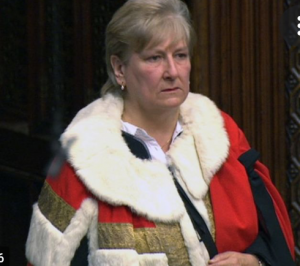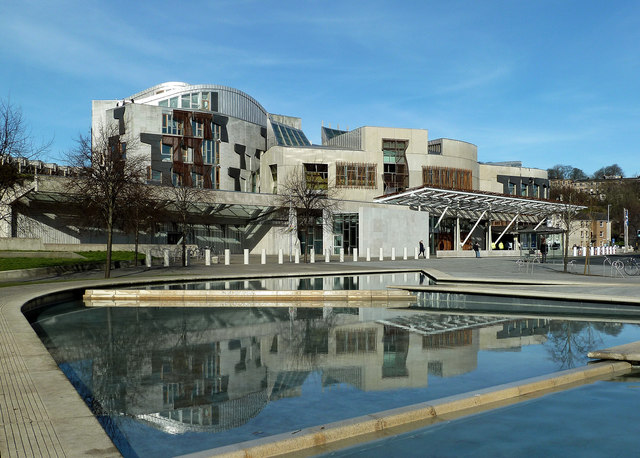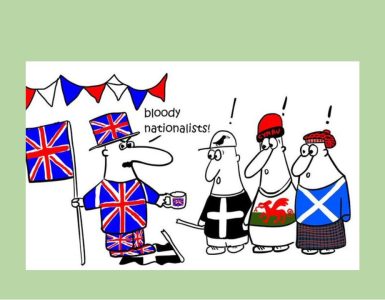The evolution of democracy in Scotland?

This is one Baroness Goldie about to take her seat in the House of Lords. You’ll likely recognise her face. She used to be leader of the Scottish Tories at Holyrood. That was when she was elected. Now she’s one of over 800 unelected Peers who make up the reviewing chamber of our UK Government.
At some point we’re going to need a second chamber at Holyrood. But it’s not going to be modelled on the House of Lords. Well, is it?
In 2017, Commonweal think tank brought out a policy proposal looking at whether we need a second chamber to complement Holyrood and if so what kind of chamber do we want? Their proposal is to set up a Citizens’ Assembly. The proposal is written by Brett Heddig who set up the Sortition Foundation exploring how we can do democracy differently.
I took myself along to a CommonWeal event where Brett presented the ideas in his Citizen’s Assembly paper. Find out how they work in the post Citizen’s Assemblies – A Good Idea?
So how might a Citizens’ Assembly work at Holyrood?
In a nutshell, Brett suggests as a starting off arrangement (to be tweaked later on):
- 73 people are selected randomly from the Scottish electorate. That’s the same number as there are constituencies to Holyrood.
- The process would allow for : age, gender, geography, and education or income level which correlate with one another.
- People would serve for two years with a rolling system of replacement.
- They’d receive a salary set at twice the average income.
- These 73 would meet three days a week. Probably somewhere outside of Edinburgh.
- They’d discuss whatever was relevant at the time which might be on the subject of recent or forthcoming legislation in Holyrood. Or it might something that is current in Scottish society that they might wish to refer to Holyrood. Or something which Holyrood asked them to consider. They could take expert advice. But the discussions and any proposals would come only from the Assembly itself.
It seems reasonable that when we’re independent we’re going to need a second chamber, a reviewing chamber to compliment the first chamber of elected MSPs. Whatever kind of second chamber we have it won’t be filled with Lords and Baronesses. But a Citizen’s Chamber? That would be an amazingly radical move.
Is it too radical? Could it ever work?
I have my doubts. In principal I really like the idea of a Citizen’s Chamber at Holyrood. But would it really work in practice?
Some questions certainly came to my mind when I first read about this :
- but don’t we need experts? House of Lords has a lot of experts and they contribute a great deal of good practice-based expertise to Lords’ debates.
- isn’t it too much to ask of them? give up their jobs for two years? be away from home for half the week? what about childcare?
- will they really be able to have the high level of debate that’s required? with very complex issues? and no background in either the issues or the art of debating?
- doing jury service also came to my mind. I’ve been on three juries and each time I’ve was taken aback at the way some people in the fifteen of us approached discussing the evidence we’d heard … a lot of it was very emotional and often biassed, either in favour or against the defendant. But on the other hand, I think that each verdict that we reached was the right verdict. We sort of muddled through our biasses.
Brett pretty covered these questions in the discussion after his talk. If you search on YouTube you’ll find a lot more about all this, where they’ve been tried and who has come out in support of them.
A Holyrood Citizens’ Chamber – the evolution of democracy in Scotland?
The more I read about Citizens’ Assemblies, the more I’m convinced that they could play a big part in the evolution of how we do democracy in Scotland over the coming years.
A Holyrood Citizens’ Chamber could be the model for a second chamber, maybe or maybe not. But maybe as a way of informing local authority planning and development? Or of developing a Scottish public broadcasting service? The new Scottish Social Security setup didn’t use a formal citizens’ assembly but they brought together a group of service users and asked them for their experience, views and make suggestions. And partly as a result of that consultation we have a new social security system which has adopted the working principle of fairness, dignity, respect and compassion.
Not a bad start, eh?
Videos of Brett Heddig’s talk in Glasgow
You can find videos of Brett’s talk in Glasgow about a Holyrood Citizens’ Chamber – in fact there are three videos, the livelink to Facebook was interrupted. The quality isn’t fantastic but it’s OK.
Part 1 – Intro . 5 mins
Part 2 / 15 mins
Part 3 / 55 mins including Q&As




